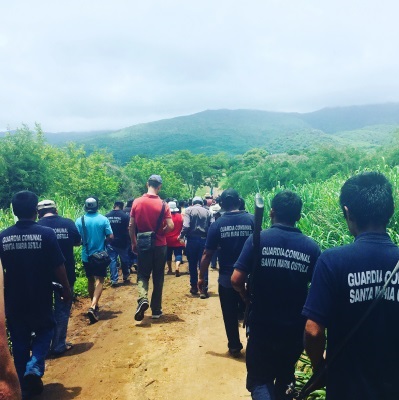By Catherine Whittaker, Postdoctoral researcher at the University of Munich and visiting researcher at the University of California San Diego
On the morning of 27 May 2019, I was hesitant to board the bus to Zamora, a small, conservative city in the Central Mexican state of Michoacán: The night before had seen the worst incidence of violence in the city’s recent memory. There had been a shoot-out between members of the Jalisco New Generation Cartel and the police in front of the Municipal Hospital on the central avenue, 5 de Mayo, in the early morning hours. Three people died, and ten were injured.
These kinds of events are considered fairly common in the lowland Tierra Caliente region of Michoacán as well as certain deprived areas, but not in a comparatively wealthy city like Zamora – up until now. Partly in shock and partly in protest, many schools and shops were closed when I arrived. The state responded with a show of power, sending a seemingly endless line of police and army trucks, which failed to make most people feel much safer.
Government institutions have been unable to halt the crime-related violence that has been rising in the state since 2006, intensifying since 2012, and continues to increase. A total of 1,277 homicide cases were registered in Michoacán in 2017 (the equivalent of almost 28 murders per 100,000 inhabitants), and 21.3% of the population had been a crime victim in 2016.
How do citizens face the challenges posed by multiple violences and institutional fragility in Michoacán? That’s what the “Activism in regions of crime-related violence and institutional fragility” project (2017-2019) seeks to answer. Our team of eight ethnographers, two policy analysts, and several research assistants, are based at UK and Mexican institutions: the University of Aberdeen, El Colegio de Michoacán, the Centro de Investigación y Docencia Económicas, and the Overseas Development Institute. We are funded by the Economic and Social Research Council in collaboration with its Mexican equivalent, CONACYT.
We began by approaching activists in various regions of Michoacán. Activism, as we defined it, refers to practices aimed at changing “the rules of the game” to achieve a more just society. In Michoacán, activists are themselves often subject to intimidation and hindered by institutional fragility. Despite this, some initiatives demonstrate the potential to achieve changes for the better, if modest.

The research team (from left to right, with affiliations): Salvador Maldonado (Colegio de Michoacán), Pilar Domingo (Overseas Development Institute), Irene Álvarez (Colegio de México), Catherine Whittaker (University of Munich/ UCSD), Sacha Jesperson (ITERU), Trevor Stack (University of Aberdeen), Denisse Román (Colegio de Michoacán), Iran Guerrero (CIDE), Adriana Sánchez, Edgar Guerra (CIDE), and Dafne Viramontes (CIDE)
By combining techniques such as structured interviews as well as direct observation in meetings and assemblies, we sought to understand and compare activist organizations’ diverse anti-violence initiatives. We then discussed our analyses with the groups in order to corroborate our findings and share our insights.
Among those insights, 3 stand out:
- Re-building trust in police and institutions is crucial for improving security.
In 2016, 93.8 % of Michoacán’s population expressed distrust and fear of the police and judicial bodies. In a climate of distrust, crime victims often prefer not to report to the police, making the resolution of crimes impossible.
Research by my colleagues, Trevor Stack, Irene Álvarez, and Denisse Román, suggests that municipalities where citizens meet with and monitor the police via regular meetings in a formalised format (Local Citizen Security Councils) have made significant progress in security matters by improving trust in police.
- Legal instruments are useful activist tools even where the law is cosmetic.
Women’s and LGBT rights activism, as well as groups searching for missing relatives have in common that they make use of legal instruments beyond the law, as research by Salvador Maldonado and Irán Guerrero shows. Their research focused on the capital of Michoacán, Morelia, where the state’s key judicial bodies are located.
For example, feminist activists successfully lobbied for the Gender Violence Alert (Alerta de Violencia de Género contra las Mujeres, AVGM) to be declared across several municipalities of Michoacán. However, this measure proved toothless, as no funding was allocated toward addressing the issue of gender violence. Still, the declaration of the Alert has helped to start conversations about gender violence in Michoacán.
- Create safe spaces from where to begin rebuilding the social fabric.
In my own interviews in Zamora, many women mentioned that fear of violence kept them from going out at night. They spoke of wanting to open up “safe spaces”: not just physical spaces, but above all spaces for reflection on one’s situation and for re-connecting with others – for fixing the “social fabric.” Feminist activists insisted that this is key to consciousness-raising.
The activist groups studied by Edgar Guerra and Ariadna Sánchez in the Tierra Caliente and coastal regions do this by founding cultural and artistic centres. These spaces are safe havens for youths wanting to escape the lure of narco-culture, and for women to talk about their experiences of violence.
For more information about project findings, our research team, policy briefs, publications and outreach events, please visit our website: https://cisrul.blog/research-projects/michoacan/


Recent Comments